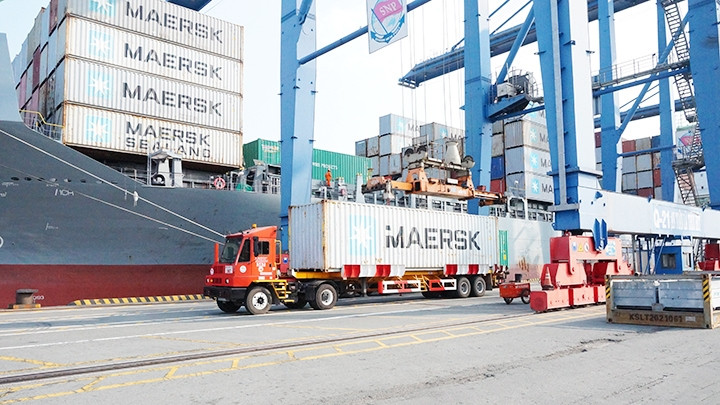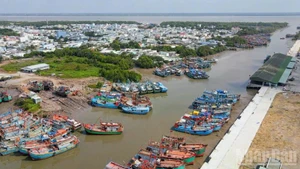Despite the COVID-19 pandemic, the import and export tax revenue of the customs sector has still increased sharply thanks to synchronous solutions and the simplification of customs procedures.
Supporting import and export enterprises
Despite being affected by the pandemic in 2020 and 2021, the frequency of large ships docking at Cai Mep-Thi Vai Port in Ba Ria-Vung Tau Province has continued to increase. The port is currently handling about 33 large ships per week, including super ships such as Margrethe Maersk with over 200,000 tonnes and Cosco Shipping Aquarius with over 197,000 tonnes. The volume of export and import goods has also increased, but with the digitisation of customs procedures and the implementation of online customs procedures, container congestion due to slow customs clearance did not occur.
The import and export tax revenue of Ba Ria-Vung Tau Customs Department still rose sharply during the pandemic, reaching an average of over 23 trillion VND (1 billion USD) per year.
In the first quarter of 2022, Binh Duong Customs Department completed procedures for 4,874 declarations with total import and export turnover of 12.7 billion USD, up 3.58% over the same period in 2021. State budget revenue as of March 15 has reached 4.67 trillion VND (203 million USD), up 22.22% over the same period last year.
According to Deputy Director of Binh Duong Customs Department Nguyen Thanh Binh, the provincial Customs Department continues to promote the application of information technology, modernise customs procedures, and strengthen dialogue with businesses to remove difficulties for enterprises.
The Ho Chi Minh City Customs Department has also implemented many solutions to facilitate import and export activities of enterprises. The Customs Department collected 32.7 trillion VND (1.4 billion USD) of state budget in the first quarter of 2022, an increase of 10.8% compared to the same period in 2021.
Deputy Director of Saigon port area 1 Custom Branch Do The Manh said that the Custom Branch handled thousands of customs declarations each day, but very few businesses come directly to carry out procedures because the procedures can be declared online through the VNACCS/VCIS system. Faster professional solutions for customs clearance have helped people and businesses save time and costs in handling import and export procedures.
Chairman of the Ho Chi Minh City Logistics Association Dang Minh Phuong shared that the operation of the customs industry in Ho Chi Minh City has seen many positive changes in recent times, including the simplification of customs procedures and the implementation of electronic customs declaration, helping logistics activities operate smoothly even during the outbreak of the COVID-19 pandemic. As a result, the flow of goods has remained stable.
Optimising operations through digital technology
The General Department of Customs has provided free customs declaration software for businesses in order to accompany and support the business community to overcome difficulties caused by the pandemic.
In Binh Duong, all core customs procedures have been completely automated through the VNACCS/VCIS system with the participation of more than 99% of enterprises, helping to handle more than 99.8% of customs declarations and reduce customs clearance time for Green Channel goods (goods exempted from detailed inspection) to only 1 to 3 seconds.
Currently, Ba Ria-Vung Tau Customs Department is providing online public services in the customs area at levels 3 and 4, meaning that 100% of procedures are conducted through the online public service system.
The Ho Chi Minh City Customs Department is looking towards building a smart customs model through the reduction of intermediary stages, streamlining the apparatus, improving customs management capacity, and facilitating import and export activities.
Since 2019, the Ho Chi Minh City Customs Department has built an ecosystem that merges the Ho Chi Minh City Customs Administration System (HCAS) with applications in support of customs management in order to speed up the handling of records in the online environment.
Deputy Head of the Information Technology Department under the Ho Chi Minh City Customs Department Vuong Tuan Nam said the application of digital technology to analyse and classify goods is one of the breakthroughs to help Ho Chi Minh City accelerate customs clearance of goods. The City Customs Department has digitised some 30,000 results of analysis and classification of items. In addition, automation technology also supports customs in inspecting, evaluating and making conclusions on whether goods are eligible for customs clearance or not. Such applications are very suitable for the building of smart customs in the future, Nam noted.
















